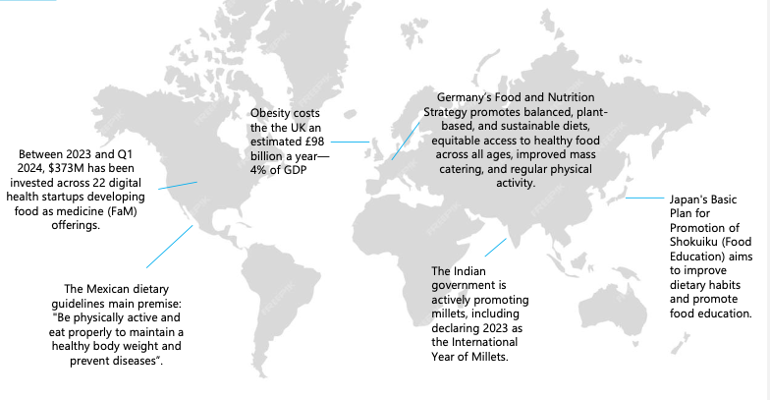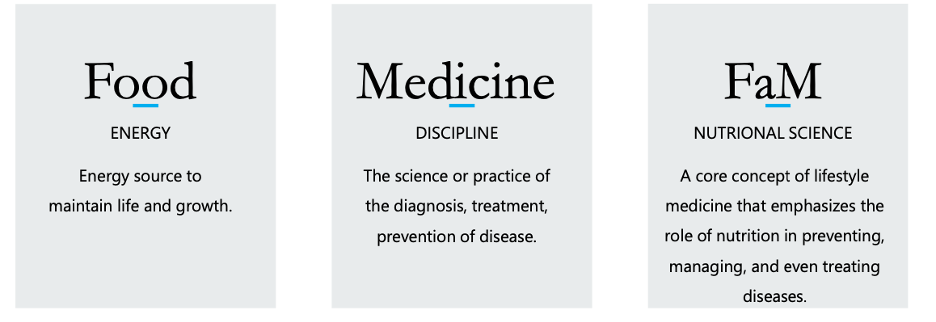Skip to main content


ALERT / SEPTEMBER 2, 2025
Food as Medicine: Why multinational employers should act now
5 MIN READ
With chronic diseases and mental health challenges on the rise, employers are seeking innovative ways to support employee wellbeing. One powerful yet underutilized tool? Food. The concept of Food as Medicine (FaM) is gaining global traction as a transformative approach to healthcare—one that multinational employers are uniquely positioned to champion. This forward-thinking framework emphasizes the role of nutrition in preventing, managing, and even reversing chronic conditions. The inclusion of FaM tactics has the potential to improve overall wellbeing while achieving long-term cost savings.
Food as Medicine (FaM) is a foundational pillar of Lifestyle Medicine (LM), which emphasizes the interconnected roles of nutrition, physical activity, sleep, stress management, substance avoidance, and social connection in promoting holistic health. Positioning FaM within the LM framework shows multinational employers how nutrition complements other lifestyle approaches—reinforcing unified messaging as LM gains influence across healthcare, policy, and corporate wellness.
Renewed focus on diet and nutrition
Poor nutrition is a significant but frequently overlooked contributor to global healthcare costs that directly impact the supplemental plans funded primarily by employers. While not always labeled as such, the impact of poor nutrition is seen through a wide range of chronic conditions and related health issues.
The Global Burden of Disease Study (opens a new window) underscores that poor diet is now a leading risk factor for early death and disability—surpassing even tobacco use. Diet-related non-communicable diseases (NCDs), including cardiovascular disease, type 2 diabetes, and certain cancers, are among the most significant health challenges globally. Leveraging a Food as Medicine approach offers a strategic opportunity to mitigate chronic disease risk, reduce healthcare costs, and enhance employee engagement and productivity.
The impact of poor nutrition is often hidden in plain sight—reflected in rising health claims, absenteeism, and chronic disease rates. Governments are responding, and employers should too. Germany (opens a new window) is promoting plant-based diets, Japan (opens a new window) is emphasizing food education, and Mexico (opens a new window) is updating its nutritional guidelines to promote healthy eating. What we eat is one of the most powerful tools to prevent illness and improve wellbeing. Food interventions can improve multiple health outcomes:
Chronic disease prevention
Cardiovascular health
Diabetes management
Mental health and cognitive improvement
Cancer prevention
Overall health and longevity

Governments around the world promoting healthy habits
Programs supporting good diet and nutrition are beginning to gain traction within employer health and wellbeing strategies worldwide. Lockton research (opens a new window) shows that more employers in Asia are offering nutritional counseling and fitness programs like yoga classes, gym subsidies and running programs than in prior years.
Food as Medicine (FaM) is gaining traction
Using food to promote health and treat illness has historical roots in many ancient cultures around the world, but insurance coverage for clinical pathways that integrate nutrition in the prevention and management of disease, such as FaM programs, is not yet prevalent in many parts of the world. Lockton’s U.S. National Benefits Survey (opens a new window) indicates that 33% of self-funded plan sponsors offer intensive lifestyle programs that emphasize nutrition, physical activity and mental health. Multinational employers need to consider program availability and regional differentiation when researching ways to implement.
FaM is more than a concept—it's a clinical and scientific approach that integrates nutritional science into healthcare. It involves:
Using food to prevent and manage chronic diseases
Incorporating dietitians and nutrition protocols into care pathways
Leveraging technology and data to personalize dietary interventions
In addition to clinical care and medication, FaM uses food to aid in the prevention, management and even reversal of chronic conditions.

What we eat affects every cell in our body. FaM includes:
Nutritional basics
Macronutrients, micronutrients and their roles in health
Diet & chronic disease
Impact on inflammatory, cardiometabolic, digestive, musculoskeletal, mental health and many more conditions
The gut-brain connection
How food affects mood, energy, and cognitive performance
Strategic FaM Levers
We recommend that organizations think about three support areas when developing a framework to provide FaM resources for employees. Specific components may not be available or appropriate for a given country or employee group:
Access | Technology | Clinical pathways |
Insurance coverage | Wearables and remote monitoring | Nutrition screening and risk assessment |
Onsite meals | Digital nutrition platforms | Medically tailored meals |
Education | Smart food delivery | Electronic health record integration & data analytics |
Community partnerships | Food Rx (Food Prescription (opens a new window)) and produce prescription programs | Dietitian integration |
Policy | Hospital discharge planning | |
Cultural relevance |
How employers can get started
Employers can start by assessing current wellness programs and identifying gaps in nutritional support. Partnering with clinical nutritionists and leveraging digital platforms can enhance engagement. Behavior change tracking can be a successful tool for employers. This could manifest as aligning wellness challenges with recognition programs or even supporting family or dependents in healthy eating habits in addition to the employee. Vendor partners can track clinical outcome indicators such as A1C or blood pressure. They can also track success metrics of the program at large, including health risk mitigation and financial results.
Employers launching initiatives locally and globally
As employers consider integrating diet, nutrition, and FaM into their plans around the world, it’s valuable to see examples of how other organizations are successfully doing so in multiple markets.
Leading technology companies in India providing healthy cafeterias
Major employers embracing green campuses and plant-based diets as part of broader sustainability and wellbeing efforts
Consulting companies creating seasonal nutrition campaigns with diet tracking
Companies in the UK providing on-site nutritionists and personalized food scores and guidance
Companies in the U.S. providing on-site food redesign, precision biology and food subsidy programs
Key takeaways
As global interest in Food as Medicine continues to grow, employers have a unique opportunity to lead. By integrating FaM into health and wellness strategies, companies can improve employee wellbeing, reduce healthcare costs, and foster a culture of health.
For further information or support in implementing Food as Medicine strategies, please contact Lockton's Global Benefits team.
Key Takeaways:
Nutrition is a powerful lever for chronic disease prevention and management.
Employers can drive impact by offering culturally relevant, accessible, and personalized nutrition support.
FaM is not a one-size-fits-all solution—tailor programs to local needs and global goals.


